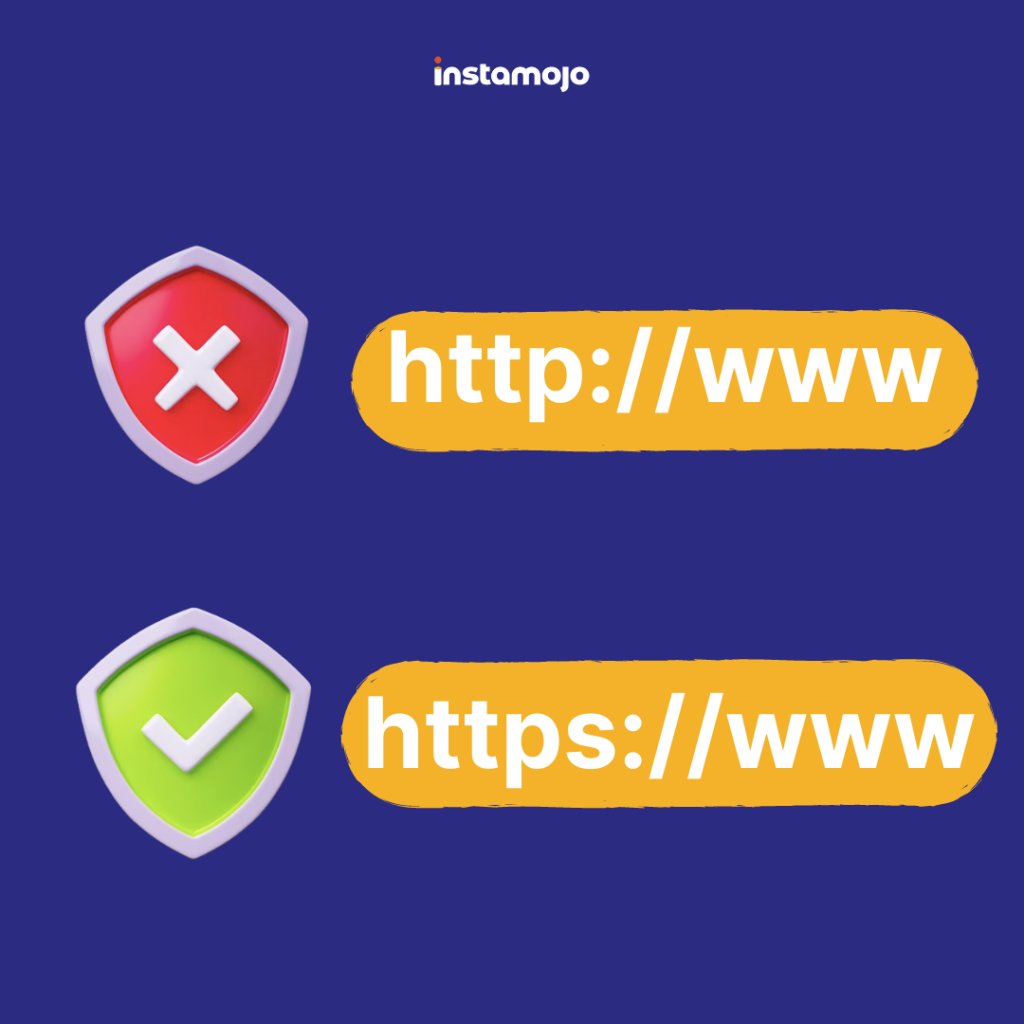Elevating eCommerce site security via HTTPS not only safeguards data but also nurtures customer trust in online transactions.
The Hyper-Text Transfer Protocol (HTTPS) has been the standard security protocol since 2014, when Google first endorsed its use as a ranking factor. Since then, it has been a significant requirement for eCommerce websites, in particular, to build trust when handling payments, with non-HTTPS websites being flagged with a red icon, marking them as insecure.
Data also shows that eCommerce stores not secured by HTTPS encounter higher bounce rates, with over 80% of customers choosing not to complete a transaction if it has been flagged as insecure. This shows that HTTPS is essential when it comes to building customer trust.
This article will give further insight into HTTPS security on eCommerce websites, its importance, and how integrating HTTPS can reduce data theft and boost customer confidence.
Contents
What is HTTPS?

HTTPS (Hyper-Text Transfer Protocol Secure) is a secured version of HTTP, an application layer protocol that enables the transfer of data between a website and a user’s web browser – the foundation of the internet.
The major question arises here now is: How SSL helps an eCommerce system to be secure? Let’s understand this!
HTTPS is secured by Transport Layer Security (TSL), previously known as SSL, and this protocol encrypts data to protect information such as passwords, credit card numbers, and other personal information.
Related read: Top eCommerce frauds in 2023 and how to prevent them
Why Is HTTPS security important for eCommerce stores?

HTTPS is significant for all websites, but for eCommerce, HTTPS can be the fine line between success and failure. Below are the three key reasons online stores must integrate HTTPS security into their sites.
1. Boosts customer trust
HTTPS is a key ranking factor for Google, and considering Google Chrome is the most widely used web browser, it is a key feature for any eCommerce website.
Without HTTPS, a website will be flagged as “Not Secure” with a red icon, warning users to exit the website and find a more secure alternative.
This has led to a huge increase in bounce rate for eCommerce stores not secured by HTTPS. As a result, affected websites have seen a significant drop in sales and conversions due to a lack of trust. Google made HTTPS a key
Related read: Abandoned carts: A guide on how to recover lost sales
When starting your own eCommerce store, make sure you incorporate this security element in your website from scratch.
Related read: 25 tips to increase your sales from Instagram
How to implement security in eCommerce?
If you plan on website builder to create your store to create your store, choose a platform that offers HTTPS integration and supports the implementation of other security measures to ensure your site remains in compliance with local privacy laws as well.
Of course, having HTTPS is no guarantee for success, and it will not increase sales, but it is a key component when building trust and boosting your brand. Furthermore, HTTPS plays a big part in search engine rankings.
Related read: What destroys the trust of customers online (and builds it + a free report)
2. Can improve Google rankings and search engine visibility
Google made HTTPS a key ranking factor in 2014, as the search engine aimed to give more visibility to secure and trustworthy websites. This saw Google update its algorithms to increase the search visibility of HTTPS websites, with even more weight given to HTTPS in a further 2015 update.
Related read: 22 updates that impacted eCommerce
In 2015, if two websites that were equal in quality were targeting the same keyword, and one was HTTPS and the other wasn’t, the HTTPS website would achieve a higher position in the SERPS. Essentially, HTTPS gave websites a competitive edge.
Related read: 3 keyword strategies to improve your online store SEO
Even in 2023, Google is still trying to encourage websites to improve security, with unsecured websites viewed harshly by the latest algorithms.
3. Protects customer data
HTTPS encrypts data transferred from a website to the web browser and vice versa, creating a secure web browsing experience. This is crucial in terms of making payments online, protecting the user’s personal information and payment details such as credit or debit card numbers.
Without this protection, cybercriminals can use a range of software and techniques to view and obtain this information, so it can be used for fraudulent activity.
If this happens, an eCommerce store can lose its customers’ trust, damaging its brand’s reputation to the extent that it becomes irreparable.
One tactic cybercriminals use is to set up spoof websites, duplicating the content of a legitimate website to encourage users to make a transaction.
With HTTPS security, bogus websites will be flagged as “not secure” in the address bar, whereas secured websites will have a small padlock icon, making it possible to identify safe websites.
eCommerce security best practices
Here are some eCommerce security best practices:
- HTTPS encryption: Use HTTPS to encrypt data for customer privacy.
- Regular updates: Keep software up to date for security fixes.
- Strong authentication: Require strong logins for accounts.
- Secure payments: Use trusted payment gateways.
- Backup data: Regularly back up your website.
- Web firewall: Protect with a firewall against attacks.
- Staff training: Educate staff about security.
- Safe hosting: Choose secure hosting services.
- Scan for vulnerabilities: Regularly scan for weaknesses.
- Clear policies: Have a transparent privacy policy.
- Data protection: Securely handle customer data.
- Security audits: Conduct regular security audits.
- Real-time monitoring: Monitor for suspicious activity.
- Content security: Validate user-generated content.
- SSL certificates: Use SSL for added security.
eCommerce security features
Here are key eCommerce security features to consider:
- SSL encryption: Protects data transmission with encrypted connections (HTTPS).
- Firewall protection: Guards against unauthorized access and attacks.
- Two-factor authentication (2FA): Adds an extra layer of login security.
- Secure payment gateways: Ensures safe handling of financial data.
- Regular software updates: Patches vulnerabilities and enhances security.
- Content filtering: Prevents malicious code injection.
- Data backups: Enables recovery in case of data loss or breaches.
- User access controls: Limits access based on roles and permissions.
- Vulnerability scanning: Identifies and addresses potential weaknesses.
- Privacy policy: Clearly states data handling practices.
- Strong password policies: Enforces robust password requirements.
- DDoS protection: Safeguards against Distributed Denial of Service attacks.
- Intrusion Detection System (IDS): Detects and responds to unauthorized access.
- Security audits: Regular assessments to identify vulnerabilities.
Security challenges in eCommerce
Here are some common security challenges in eCommerce:
- Payment fraud: Risk of financial loss from fraudulent transactions.
- Data breaches: Customer data theft erodes trust.
- Phishing attacks: Deceptive emails steal sensitive info.
- Malware/ransomware: Malicious software disrupts and demands ransom.
- DDoS attacks: Website disruption through overwhelming traffic.
- Third-party risks: Vulnerabilities in external services.
- Weak authentication: Insecure logins invite unauthorized access.
- Insecure APIs: Open doors for hacking via interfaces.
- Insider threats: Internal actors jeopardize security.
- Encryption lapses: Unprotected data is exposed to hackers.
- Delayed patching: Unpatched systems invite exploitation.
- Social engineering: Manipulating users for data access.
- Mobile insecurity: Unprotected mobile apps and data.
- Regulatory compliance: Legal risks from data law violations.
- Privacy concerns: Data usage and storage worries about customers.
Conclusion
To sum up, let’s search for the answer to this question: Why is https important in ecommerce?
HTTPS holds immense significance for eCommerce websites, aiding in demonstrating to customers that the website is secure and trustworthy when they conduct online transactions.
In addition, HTTPS is also considered a key ranking factor by Google, and by encrypting data, all data sent across the internet is safe from cybercriminals.
This article was penned by a guest author. Nahla Devies works as a software developer and tech writer. Before her full-time technical writing role, she led programming at an Inc. 5,000 experiential branding firm. The firm’s clients include Samsung, Time Warner, Netflix, and Sony.

